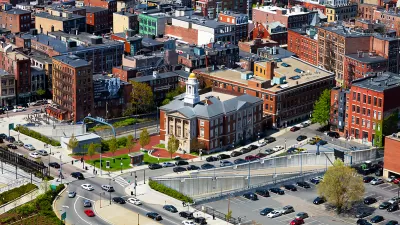Large buildings with uses of all kinds will be subject to Boston's new "Maximum Parking Ratios."

Christian MilNeil reports: "The City of Boston recently announced new planning guidelines for large developments that will limit the amount of parking that developers will be allowed to build, with stricter limits applying in the city’s most transit-accessible neighborhoods."
The city laid out the new "Maximum Parking Ratios" in a new map, with tables and a color code that matches ratios to corresponding land uses.
"In downtown, the South End, and Back Bay, where transit options are most abundant and city streets are the most congested, the new rules would limit developers to building, at most, 0.35 parking spaces per rental apartment, and 0.3 parking spaces per 1,000 square feet of office or lab space," explains MilNeil to provide some specificity on the parking ratios.
"The new maximum parking ratios only to large projects that are over 50,000 square feet in size, which is roughly the size of a 50-unit apartment building."
Differentiating these Maximum Parking Ratios from zoning reforms that remove minimum parking requirements—a more common practice in U.S. cities with every passing year—MilNeil explains that political support is building for more comprehensive parking reforms.
These Maximum Parking Ratios are a critical first step in the larger reform effort.
The Maximum Parking Ratios do accomplish reforms for minimum parking requirements, however. "Throughout the entire city, the new guidelines also specify that zero parking would be allowed for new developments, in conjunction with required 'transportation demand management' plans to provide more car-free transportation options," adds MilNeil.
FULL STORY: Boston Establishes Maximum Parking Rules for Large Developments

Planetizen Federal Action Tracker
A weekly monitor of how Trump’s orders and actions are impacting planners and planning in America.

Maui's Vacation Rental Debate Turns Ugly
Verbal attacks, misinformation campaigns and fistfights plague a high-stakes debate to convert thousands of vacation rentals into long-term housing.

San Francisco Suspends Traffic Calming Amidst Record Deaths
Citing “a challenging fiscal landscape,” the city will cease the program on the heels of 42 traffic deaths, including 24 pedestrians.

Defunct Pittsburgh Power Plant to Become Residential Tower
A decommissioned steam heat plant will be redeveloped into almost 100 affordable housing units.

Trump Prompts Restructuring of Transportation Research Board in “Unprecedented Overreach”
The TRB has eliminated more than half of its committees including those focused on climate, equity, and cities.

Amtrak Rolls Out New Orleans to Alabama “Mardi Gras” Train
The new service will operate morning and evening departures between Mobile and New Orleans.
Urban Design for Planners 1: Software Tools
This six-course series explores essential urban design concepts using open source software and equips planners with the tools they need to participate fully in the urban design process.
Planning for Universal Design
Learn the tools for implementing Universal Design in planning regulations.
Heyer Gruel & Associates PA
JM Goldson LLC
Custer County Colorado
City of Camden Redevelopment Agency
City of Astoria
Transportation Research & Education Center (TREC) at Portland State University
Jefferson Parish Government
Camden Redevelopment Agency
City of Claremont





























